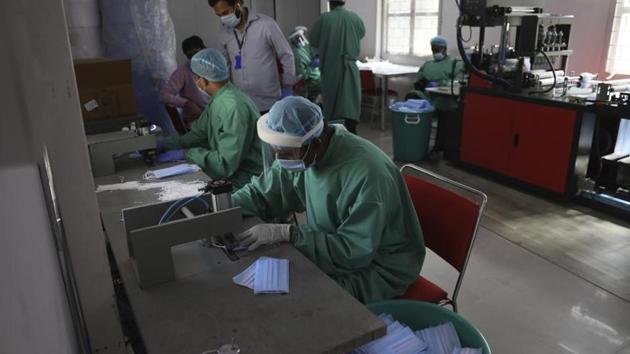When Rajasthan’s Pali made reusable PPE kits from umbrella fabric
Until April 10, when Pali had two Covid-19 patients, the district had locally produced 2,500 PPE kits and supplied many to neighbouring districts, too.
When Pali, a textile town in western Rajasthan, had its first coronavirus disease (Covid-19) patient on March 19, Rohitashva Singh Tomar, a 2016-batch Indian Administrative Service (IAS) officer posted as sub-divisional magistrate (SDM), understood that in days to come the district would require many personal protection equipment (PPE) kits and the government supply may not be sufficient.

According to a health ministry official, Rajasthan has been allocated 16,500 PPEs. Although health minister Raghu Sharma has repeatedly said there was no shortage, but supply to the districts wasn’t enough.
Until April 10, when Pali had two Covid-19 patients, the district had locally produced 2,500 PPE kits and supplied many to neighbouring districts, too. And guess what came handy for this – the fabric used to make umbrellas in Falna, a small railway station on the Ahmedabad-Jaipur rail route.
After approval of district collector Dinesh Chand Jain, Tomar called a meeting of local textile units and officials of the industries department to discuss if they could locally produce the PPEs. Syed Rajjak Ali Khan, general manager of District Industries Centre, suggested using fabric from Falna to make PPEs.
“Falna is famous for production of umbrellas and its parts. There are about 80 units. After the lockdown, the factories were shut and had about 20,000 metres of the fabric in their inventory. We got 10 metres from there and gave it to local tailors to stitch,” said Tomar.
He said a sample was made and given to Pali Medical College for testing. According to Dr Harish Kumar Acharya, professor and head of forensic medicine department, the kit passed the test. “It was fit to be autoclaved, and given a green signal by the colleagues from the microbiology department for infection control,” said Acharya.
After the go-ahead from the experts, Anil Gulechha, chairman of Central Effluent Treatment Plant (CEPT) Foundation, an association of textile unit owners, procured the fabric from Falna.
“Local tailors stitched the kit in my factory. We began supplying the kits to the district administration by March 25,” said 48-year-old Gulechha of Bherawa Textile Industries.
The USP of the local PPE kits is its reusability, says the collector. “The PPEs given by the government are use-and-throw kits. For one patient, from collecting samples to get him to hospital, around 10 PPEs are used. That drains the small government supply. The kits produced in Pali can be disinfected and reused,” he said.
According to Tomar, the CEPT Foundation has supplied 1,000 kits to district administration free of cost. “We have also given 400 kits each to Jalore and Jaisalmer districts, 200 to Kota and 100 to Beawar. The wildlife department of the district has also taken PPEs from us. For us, the kits are free, for the other users, they are priced Rs 485 each,” said the SDM.
Acharya, who is involved in design and development, said the kit has undergone several modifications and is now being made at three levels – level 1 for use by field staff, level 2 for use by use health care workers involved in care of suspected and positive cases, and level 3 for use by people in ICU where surgical interventions are needed.
Gulechha said the kit comprises a face shield, an overall, an apron and a pair of shoe covers, and taken around 4.15 mts of the fabric. Pali has around 800 textile units and the annual turnover is about Rs 8, 000 crore. Like Bhilwara textile industry is known for suiting and shirting, those in Pali are known for printing and processing of ladies wear.






